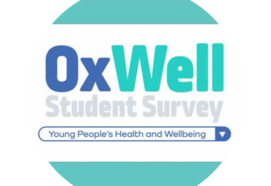If you or a person you know is struggling with their mental health, please seek support by accessing the helplines and resources provided by the NHS website. For those outside the UK please use an internet search to find an organisation that can offer direct support.
As an increasingly recognised phenomenon, self-harm is defined as any intentional non-fatal act of self-injury, or self-poisoning, irrespective of the type of motivation (Geulayov, 2019). Self-harm behaviours can present with or without suicidal intent, however it is considered as one of the strongest predictors of suicide and is most prevalent in people under the age of 25 years (Ross, 2023).
Worldwide, 10-20% of young people have reported having self-harmed at least once before the age of 18 (Hawton, 2012). According to data published in the Mental Health of Children and Young People in England, 2023 Survey, 30.4% of children (aged 8 to 16 years) with a probable mental health disorder had tried to harm themselves, compared to 4% of children unlikely to have a mental health disorder. Furthermore, 69.5% of young people (aged 17 to 25 years) with a probable mental health disorder had ever tried to harm themselves, compared to 21.3% of those unlikely to have a mental health disorder, with self-harm appearing to be more common in young women than young men (Mental Health of Children and Young People in England, 2023 Survey, 2023).
1 March is globally recognised as Self-Harm and Self-Injury Awareness Day and serves as an opportunity to raise awareness, encourage an understanding, and promote more conversations around the topic of self-harm and self-injury.
This Self-Harm and Self-Injury Awareness Day, we encourage you to explore the learning opportunities available on our website and do please share with your networks and colleagues.
Need support?
For those based in the UK, if you need support please use these helplines as provided by NHS website. For those outside the UK please use an internet search to find an organisation that can offer direct support. Do not suffer in silence, reach out.
- Samaritans: Confidential support for people experiencing feelings of distress or despair.
Phone: 116 123 (free 24-hour helpline). - PAPYRUS: Young suicide prevention society.
Phone: HOPELINE247 0800 068 4141 (24-hours every day, 365 days of the year).
Text: 07860039967 - CALM is the Campaign Against Living Miserably, for men aged 15 to 35.
Phone: 0800 585858 (Helplines are open 17:00pm-midnight, 365 days a year. Webchat is also available.)
Resources
Podcasts
- NEW PODCAST with Dr. Galit Geulayov and Dr. Rohan Borschmann ‘Self-harm Behaviours and Loneliness: Insights from the OxWell Student Survey’
- Podcast with Dr. Marica Leone ‘Melatonin Use and the Risk of Self-Harm and Unintentional Injuries in Youths’
- Podcast with Dr. Alessio Bellato ‘Evidence Synthesis Studies, and Autonomic Dysregulation and Self-injurious Thoughts and Behaviour’
- Podcast with Dr. Jocelyn Meza ‘Common Elements in Treatments for Youth Suicide Attempts and Self-harm’
- Podcast with Dr. Naomi Warne and Dr. Helen Bould ‘Emotional Dysregulation, Disordered Eating, and Self-harm: Associations and Mediating Pathways’
- Podcast with Dr. Britt Morthorst ‘The TEENS randomised feasibility trial: Internet based intervention for non-suicidal self-injury in adolescents’
Lectures, talks, and discussions
- Webinar ‘Self Harm – Pedagogy in Practice’ (2022)
- Webinar ‘Understanding Self-harm & Suicide – Ask the Expert’ with Professor Dennis Ougrin
Open Access papers from ACAMH journals
- ACAMH Featured Paper from the JCPP ‘Research Review: Viewing self-harm images on the internet and social media platforms: systematic review of the impact and associated psychological mechanisms’, (2023), Karima Susi, Francesca Glover-Ford, Anne Stewart, Rebecca Knowles Bevis, and Keith Hawton
- ACAMH Featured Paper from the JCPP ‘Mortality risk following self-harm in young people: a population cohort study using the Northern Ireland Registry of Self-Harm’, (2023), Emma Ross, Dermot O’Reilly, Denise O’Hagan, and Aideen Maguire
- ACAMH Featured Paper from the JCPP ‘Emotional dysregulation in childhood and disordered eating and self-harm in adolescence: prospective associations and mediating pathways’, (2022), Naomi Warne, Jon Heron, Becky Mars, Francesca Solmi, Lucy Biddle, David Gunnell, Gemma Hammerton, Paul Moran, Marcus Munafò, Ian Penton-Voak, Andy Skinner, Anne Stewart, and Helen Bould
- ACAMH Featured Paper from the JCPP ‘Melatonin use and the risk of self-harm and unintentional injuries in youths with and without psychiatric disorders’, (2023), Marica Leone, Ralf Kuja-Halkola, Tyra Lagerberg, Johan Bjureberg, Agnieszka Butwicka, Zheng Chang, Henrik Larsson, Brian M. D’Onofrio, Amy Leval, and Sarah E. Bergen
- ACAMH Featured Paper from the CAMH journal ‘A qualitative study of young people’s lived experiences of suicide and self-harm: intentionality, rationality and authenticity’, (2023), Hazel Marzetti, Lisa McDaid, and Rory O’Connor
- ACAMH Featured Paper from the CAMH journal ‘Review: Interventions to prevent or manage self-harm among students in educational settings – a systematic review’, (2023), Rasanat Fatima Nawaz, Joanna K. Anderson, Louise Colville, Catherine Fraser-Andrews, and Tamsin Jane Ford
- Review Article from the CAMH journal ‘Systematic review and metasynthesis of qualitative literature on young people’s experiences of going to A&E/emergency departments for mental health support’, (2023), Gianna Cadorna, Norha Vera San Juan, Heather Staples, Sonia Johnson, and Rebecca Appleton
- Review Article from the CAMH journal ‘Digital experiences and their impact on the lives of adolescents with pre-existing anxiety, depression, eating and nonsuicidal self-injury conditions – a systematic review’, (2022), Katarzyna Kostyrka-Allchorne, Mariya Stoilova, Jake Bourgaize, Miriam Rahali, Sonia Livingstone, and Edmund Sonuga-Barke
- ACAMH Featured Paper from JCPP Advances ‘Internet based intervention (Emotion Regulation Individual Therapy for Adolescents) as add-on to treatment as usual versus treatment as usual for non-suicidal self-injury in adolescent outpatients: The TEENS randomised feasibility trial’, (2022), Britt Morthorst, Markus Harboe Olsen, Janus Christian Jakobsen, Jane Lindschou, Christian Gluud, Michella Heinrichsen, Bo Møhl, Lotte Rubæk, Olivia Ojala, Clara Hellner, Johan Bjureberg, and Anne Katrine Pagsberg
- Research Review from JCPP Advances ‘Autonomic dysregulation and self-injurious thoughts and behaviours in children and young people: A systematic review and meta-analysis’, (2023), Alessio Bellato, Muskaan Aleeza Admani, Camila Deak, Luis Carlos Farhat, Maria Carolina Fontana Antunes de Oliveira, Rebeca Vasconcelos, Margherita Malanchini, Elizabeth Shephard, and Giorgia Michelini
Need support?
For those based in the UK, if you need support please use these helplines as provided by NHS website. For those outside the UK please use an internet search to find an organisation that can offer direct support. Do not suffer in silence, reach out.
- Samaritans: Confidential support for people experiencing feelings of distress or despair.
Phone: 116 123 (free 24-hour helpline). - PAPYRUS: Young suicide prevention society.
Phone: HOPELINE247 0800 068 4141 (24-hours every day, 365 days of the year).
Text: 07860039967 - CALM is the Campaign Against Living Miserably, for men aged 15 to 35.
Phone: 0800 585858 (Helplines are open 17:00pm-midnight, 365 days a year. Webchat is also available.)




Discussion
I just wanted to express my gratitude for this uplifting and inspiring blog post. It’s refreshing to read something so positive and encouraging. Keep up the fantastic work!